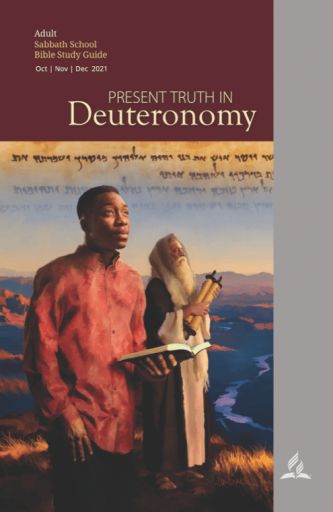
The Book of the Covenant: Deuteronomy
The story goes like this: during the reign of King Josiah in Jerusalem (640–609 b.c.), someone, probably working in the temple, found a copy of a book, and the book was read before King Josiah. “Now it happened, when the king heard the words of the Book of the Law, that he tore his clothes” (2 Kings 22:11, NKJV). Why? Because he realized that he and his people were not obeying what was written in the book.
Then, on the basis of that book, called the “Book of the Covenant” (2 Kings 23:2, NKJV), Josiah began a great reformation. We can read about that reformation in 2 Kings 23.
What was the book that had such an impact on the king and his nation? It is believed to be Deuteronomy, our study for this quarter.
The fifth and last of the five books of Moses, Deuteronomy—a name that comes from the Latin word deuteronomium (which means “second law”)—could be summarized as follows:
Having left Egypt and having entered into the covenant at Sinai with the Lord, the children of Israel—instead of going directly to Canaan—wandered in the wilderness for 40 years. When the 40 years were finished and the Hebrews were finally about to cross over to the Promised Land, Moses spoke to them in a series of speeches. The essence of those speeches was: You’re now about to enter the Promised Land. Finally! Don’t forget what the Lord has done for you, and don’t forget what He asks of you now, which is to love Him with all your heart and soul and to reveal that love by obedience to all His commandments, all according to the covenant.
To stress the importance of the covenant, Moses repeated to the people the Ten Commandments, the legal foundation of their obligations in the covenant that the Lord had first cut with their fathers, and, again, was doing so—but now with them right on the borders of Canaan.
Hence, we ask: Might there be parallels with what the children of Israel, on the borders of the Promised Land, faced—and what we, today, right on the border of the Promised Land (only a much better one), face as well?
Thus, the topic for this quarter is called “Present Truth in Deuteronomy.” And that’s what we’re going to look at: present truth messages that we can take from God’s words to His covenant people.
In this quarter, we will look at Deuteronomy topically, covering such themes as the everlasting covenant, law and grace, what it means to love God and your neighbor, and—most important of all—how the book of Deuteronomy reveals to us the love of God, which was most powerfully made manifest in the death of Jesus on the cross and His resurrection.
Sure, a vast time and cultural divide separates our church today from the church in the wilderness. But perhaps what we have in common with them might be more than what divides us from them. For example, could not the following words be spoken to us as well?
“ ‘Surely I have taught you statutes and judgments, just as the Lord my God commanded me, that you should act according to them in the land which you go to possess.
“ ‘Therefore be careful to observe them; for this is your wisdom and your understanding in the sight of the peoples who will hear all these statutes, and say, “Surely this great nation is a wise and understanding people” ’ ” (Deut. 4:5, 6, NKJV).
Notice, it wasn’t the laws themselves that were their “wisdom and understanding” before the nations—but their obedience to those laws. Certainly, there’s a message for us here, just one of many, as we will see, in the book of Deuteronomy.
Clifford R. Goldstein is editor of the Adult Sabbath School Bible Study Guide and author of Baptizing the Devil: Evolution and the Seduction of Christianity.
© 2021 General Conference of Seventh-day Adventists®. All rights reserved. No part of the Adult Sabbath School Bible Study Guide may be edited, altered, modified, adapted, translated, reproduced, or published by any person or entity without prior written authorization from the General Conference of Seventh-day Adventists®. The division offices of the General Conference of Seventh-day Adventists® are authorized to arrange for translation of the Adult Sabbath School Bible Study Guide, under specific guidelines. Copyright of such translations and their publication shall remain with the General Conference. “Seventh-day Adventist,” “Adventist,” and the flame logo are registered trademarks of the General Conference of Seventh-day Adventists® and may not be used without prior authorization from the General Conference.
For questions and concerns about the Adult Bible Study Guide, please contact the Editor of the Bible Study Guide, Clifford R. Goldstein